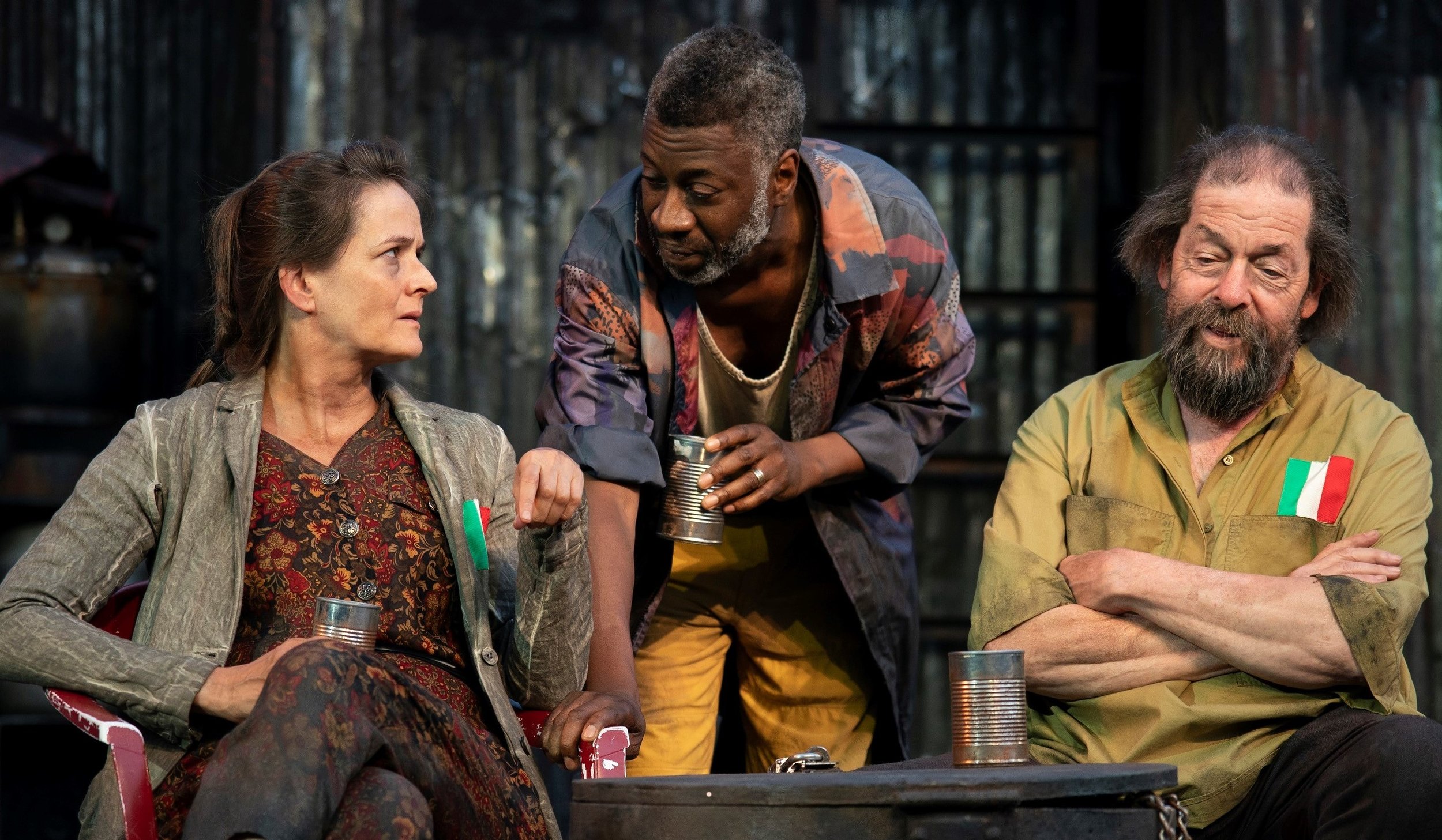Jonathan Cake (left) is a warrior general and Kate Burton is his tough-minded mother Volumnia, in William Shakespeare’s Coriolanus at the Delacorte Theater in Central Park.
Shakespeare’s tragedy of Coriolanus isn’t often done—Daniel Sullivan’s production at the Delacorte Theater in Central Park is the first in that venue in 40 years. But Sullivan’s staging is not only for Shakespeare completists. It’s a brilliant rendering, crowned by a towering performance from Jonathan Cake in the title role.
Tullus Aufidius (Louis Cancelmi, right) with an aide (Christopher Ryan Grant).
To those unfamiliar with the play, the hero’s character may be a stumbling block. Coriolanus has none of Hamlet’s mystery or Othello’s inner strife. Known initially as Caius Martius, he’s a Roman general who’s absolutely fearless. When Cake’s warrior hears that the Volsces, Rome’s barbarian enemies, are on the march, he jumps up and down like a child at the prospect of battle.
But Coriolanus doesn’t want praise for his success, although he sees himself as a patriot. Born an aristocrat, he certainly doesn’t want anything from plebeians. He’s loud in excoriating them to their faces: “You common cry of curs!” But the rabble is in an uproar because the Senate is withholding grain, although there’s plenty in the storehouses, and they are starving. Fearing rebellion, the Senate has granted the populace two tribunes as their representatives and a trickle of grain.
Class divisions, overweening pride, and poisonous politics bubble throughout Coriolanus. The tragic hero has a perverse kind of valor, yet he’s held in check by the Senate and the people’s tribunes. Cake, tall and broad-shouldered, is clear-spoken, nuanced, and riveting. He gives us the form of a warrior with a strain of immaturity, a joy in battle, and unexpected moments of comedy, some of which involve his formidable mother, Volumnia.
The relationship of Coriolanus and Volumnia is also bound up in politics. Kate Burton, the fierce, grim matriarch with scraggly hair, is flintier than any man and dresses the part, wearing slacks. She wants to realize her thwarted ambitions through him; she keeps count of every wound, and even examines his new ones proudly. She knows he can become a consul if he plays his cards right, but he’s reluctant to visit the Senate “to hear my nothings monstered.”
Teagle F. Bougere (center) as Menenius dresses down the tribunes, Junius Brutus (Enid Graham, left) and Sicinius Velutus (Jonathan Hadary).
“Know, good mother,” he tells her, “I had rather be their servant in my way/Than sway with them in theirs.” Nonetheless, he goes. There, however, he shifts uncomfortably from foot to foot and abruptly leaves before the debate to avoid hearing himself praised. The debate finished, a senator says, “Let him be called for.” Almost simultaneously Coriolanus appears. It’s funny, and it probably hints at his childish streak: he can’t wait to know what’s happened.
That flaw is particularly evident when Volumnia advises him to butter up the rabble by talking about his war wounds: “with such words that are but roted in your tongue, though but bastards and syllables of no allowance to your bosom’s truth.” When he continues to resist, she finally says angrily, “Do as thou list.” Then Coriolanus folds. “Pray be content,” he says. “Mother, I am going to the marketplace,” and Cake plays it just right, like a naughty little boy wheedling to get back in mommy’s good graces.
But Shakespeare’s language seems to suggest cynically that all the adults behave immaturely. After the tribunes hear that the people have approved Coriolanus for consul, they rebuke them with “Could you not have told him as you were lessoned?” Like schoolchildren, they’d been taught what to say, just as Volumnia coached Coriolanus. And Teagle F. Bougere’s sly and oily-tongued Menenius, a father figure to Coriolanus and his persistent advocate, understands the tribunes’ power game. He dresses them down with “Your abilities are too infant-like for doing much alone.”
Cake with Nneka Okafor as his wife, Virgilia. Photographs by Joan Marcus.
The acting is of a high order throughout. Enid Graham and Jonathan Hadary are the louche, underhanded tribunes. Tom Nelis is a grizzled Cominius, Coriolanus’s fellow general. And a full-bearded, dark-eyed Louis Cancelmi is Aufidius, leader of the Volsces and Coriolanus’s longtime rival. After the tribunes engineer banishment for Coriolanus, he seeks refuge with Aufidius, who rescinds their hate and appoints Coriolanus to lead half his army against Rome. When his plan goes awry, and Coriolanus apologizes, Cancelmi puts a brotherly hand of consolation on his neck—but then his hand comes down and he wipes it unobtrusively on his garment. Moments later he baits Coriolanus by calling him “Boy of tears” and sets off the final tragedy.
Sullivan and set designer Beowulf Boritt have set the play in some futuristic Mad Max world, with corrugated metal walls and gates, punctured oil drums, metallic garbage, and even a rusted-out automobile. It injects a feel of contemporaneity to the class and ethnic struggles, but it feels irrelevant. Japhy Weideman’s lighting is excellent, topped by the final image of Aufidius wandering off alone through a hellish conflagration. This is first-rate Shakespeare.
The Public Theater production of William Shakespeare’s Coriolanus plays through Aug. 11 at the Delacorte Theater in Central Park (enter at 81st Street). Performances are at 8 p.m. Tuesday through Sunday. Tickets are free. For further information, visit publictheater.org.






